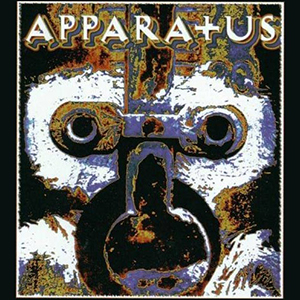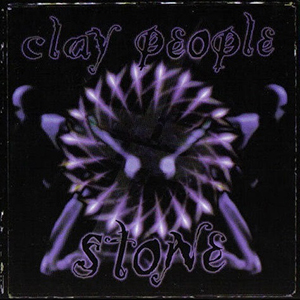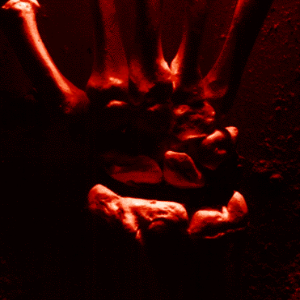Waiting for God was a Canadian goth-industrial band from Vancouver, British Columbia, Canada, who recorded from 1994 to 1997. The band consisted of Daemon Cadman, Martin Myers, Greg Price and Steven Fairweather; lead singer Cadman's lyrics were often about her murdered brother, Jesse Cadman. Waiting For God released two albums, Quarter Inch Thick and Desipramine, before breaking up.

East Side Militia is the second studio album by Chemlab, released on October 8, 1996 by Fifth Colvmn and Metal Blade Records. Its original title was supposed to be "Jesus Christ Porno Star". It was re-released on November 30, 1999 by Martin Atkins' label Invisible Records with two additional tracks, "Vera Blue" remixed by PIG and "Exile" on Mainline remixed by haloblack.

The Clay People is the third studio album by The Clay People, released on May 12, 1998 by Slipdisc Records.

LetDownCrush is the third studio album by 16volt, released on August 7, 1996 by Cargo and Re-Constriction Records.

Skin is the second studio album of 16volt, released on January 13, 1994 by Re-Constriction Records.

Divide by Zero is the second studio album by Killing Floor, released on September 23, 1997 by Re-Constriction Records.

Hypersonic Hyperphonic is the second studio album by Tinfed, released on December 3, 1996 by Re-Constriction Records. Option described the album as "walk[ing] the tightrope between discordant rock and synthcore."

Apparatus is the eponymously titled and only album by Apparatus, released on August 1, 1995 by Re-Constriction Records. Promotional music videos were filmed for the songs "Come Alive" and "Hell's Home". After the album's publication the trio disbanded, with keyboardist David York and guitarist Scott Morgan forming the band Liquid Sex Decay later.

Stone-Ten Stitches is the second studio album by Clay People, released in November 1997 by Re-Constriction Records.
Hexedene were an English electro-industrial group comprising vocalist Katie Helsby and guitarists Ian Palmer and Jonathan Sharp. They were recognized for fusing techno and industrial with leading female vocals. Helsby and Palmer signed their project Streem to a large record label after recording sessions finished for Hexedene's first album and as a result departed to leave Sharp as the sole member. The band released two albums: Choking on Lilies in 1997 and Bullet Proof Diva's in 2001.

Bullet Proof Diva's is the second studio album by Hexedene, released on August 15, 2001, by Matrix Cube.

Big Shiny Spears is the debut studio album of Iron Lung Corp, released on March 25, 1997, by Re-Constriction Records.

Waiting for God is the self-titled debut studio album of Waiting for God, released in late 1994 by KMG. The album was re-issued as Quarter Inch Thick by Re-Constriction Records in 1996 with an expanded track listing featuring bonus remixes.

In Radiant Decay is the second studio album by Christ Analogue, released on April 8, 1997, by Cargo Music and Re-Constriction Records. Compared to the band's punk-styled live performances, the album displays more of the band's talent for combining industrial, techno and indie rock into an electronic music format.

Unit:187 is the debut studio album of Unit:187, released on February 6, 1996 by 21st Circuitry.

Disrepair is the second studio album by LUXT, released on March 18, 1997 by 21st Circuitry.

funkyhell is the second studio album by haloblack, released on November 1, 1994 by Fifth Colvmn Records. The album represented the band's musical shift from a guitar dominated syle into a minimalist approach to dark ambient and electronic music composition.

The Coiled One is the second studio album by Spahn Ranch, released on September 12, 1995 by Cleopatra Records. Founding member and chief composer Rob Morton departed from the band soon after recording sessions for the album had finished. The album's main musical theme is about religion. The Coiled One was released on Bandcamp as a music download in 2011.

Atonement is the debut studio album of Final Cut, released on May 28, 1996 by Fifth Colvmn Records.

Hands of Ash is the sixth studio album by Trust Obey, released on July 23, 1996 by Fifth Colvmn Records.


















